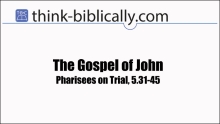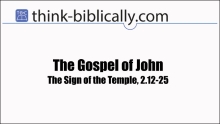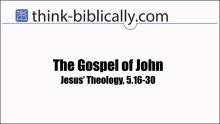
After giving the Pharisees a theology lesson, he takes them to court. Not literally, of course, but he uses the language of a trial — "testimony" and "deeds" and "accuse" — to make the case that he is indeed the Messiah. The first line of today's passage, however, is both surprising and confusing. Jesus states, "If I testify about myself, my testimony is not true." What did Jesus mean and why is his word not enough? I think the answer is in the law, and the two courts in which a person can be judged.

Thinking about the book of John this week took me on a bit of a rabbit trail. I'd like to walk you through it as I think it will make an interesting research project after we're done working through this gospel. The trail head is John chapter two and Jesus' first miracle. Jesus turned the water in two stone vessels to wine. What happens with those vessels next? We don't know, but my mind made a connection to handkerchiefs and aprons that, after touching the apostle Paul's body, could heal sickness and exorcise demons (Acts 19.11-12).

It's an interesting parenthetical comment the apostle John leaves us at the beginning of chapter four. He says that Jesus did not baptize people, only his disciples did. Which may be true on this one occasion, but it isn't true always. John 3.22 states "Jesus and his disciples came into Judean territory, and there he spent time with them and was baptizing." At this time many came to follow Jesus. In chapter four, there are already a great number who are following Jesus which caught the attention of more than Nicodemus, but the other Pharisees too. So Jesus decided to move on.

From Cana Jesus, Mary, James and other brother's of Jesus as well as the disciples all traveled to Capernum (16 miles) for a few days before continuing on to Jerusalem (85) miles for the Passover. There has been much debate over verse 12 since Catholics adhere to the eternal virginity of Mary. What did John "really mean" by Jesus's "brothers"? Epiphanius (an early church father) argued they were children of Joseph by a previous marriage; Jerome argued they were cousins; Heldivian argued the obvious, that they were the children of Mary and Joseph born after Jesus. Sometimes a brother is just a brother.

In Act 3 of a three act story Jesus confronts the Pharisees for healing a crippled man on the Sabbath. Behind the healing is Jesus' command that the man pick up his mat and walk, an act that was not permitted on the holy day. The Pharisees were less concerned with Jesus' act of healing (something that should have signaled them that he was the Messiah) and were more exercised with his instruction which violated their own law. Jesus answers their objections with a theology lesson chock full of "solemn truth". We pick the story up in chapter five verse 16.

The end of chapter four is another story of faith, but one that differs greatly from the others we've encountered thus far. We've seen a man looking for faith, and a woman and foreign people embracing faith. Here we have a man who exhibits a developed faith. The story appears simple enough by itself, and it is, but there is more to be understood when we look at the greater context. This wider look at the story will answer questions like, where did the Roman official gain such faith in Jesus? Before we get started, read the story in John 4.46-54.

Yesterday we discovered John's intention in telling us the story about Jesus and Nicodemus, today we'll have a look at this short but powerful discussion. To set the stage, Nicodemus comes to Jesus in the night in order to avoid being seen and to satisfy his curiosity about the true identity of this new Rabbi. He has been witness to several of Jesus' miracles and heard of still more. Could this be the long awaited Messiah? Or is he simply a more convincing con man? He had to know, but feared the ridicule he would suffer from his fellow councilmen should they find out.

This is the fifth day of 20 that John tells us about the life of Jesus and is a continuation of John's initial theme of "The Peaceful First Coming of the Messiah". In verse 43 of the first chapter we learn of Jesus' desire to set out for Galilee. No explanation is given as to why Jesus wanted to head there, but we can surmise it was on the way to Cana, where we find Jesus three days later at the start of chapter two. Jesus' mother and the disciples were all invited to the wedding where the action starts in 2.3.

Once again Jesus treks to Jerusalem for a feast, probably the feast of Pentecost. There are three feasts each year on the Jewish calendar that require being in Jerusalem: Passover (which is the the last festival where Jesus overturned the money changers tables), Pentecost and, later in the year, Tabernacles. Pentecost occurs 49 days after Passover, so we know that five weeks have passed since he was last in the Holy City. Jerusalem had eight gates entering the city, and near one of these gates (the Sheep Gate) is a pool with supposed miraculous powers. The Pool of Bethesda.

John has shown his ability to be a great author. The way he weaves the conversation with Nicodemus is masterful. His juxtaposition of the conversation with Nicodemus and the Samaritan woman provokes thoughtful contemplation. So it's curious that we find an apparent contradiction, or a narrative that requires more explanation at the very least. After two days in Samaria, Jesus went on to Galilee where he apparently received a warm welcome, not only from friends but from those who saw the miracles he performed in Jerusalem. So why does Jesus say "a prophet has no honor in his own country"?

John chapter three begins with a conversation between Jesus and Nicodemus. John tells us that Nicodemus was a member of the Jewish ruling council, and Jesus refers to him as "the teacher of Israel." We know that he was a leading Pharisee and a member of the Sanhedrin. There are a few things we can learn about Nicodemus immediately. First, he is not trying to trap Jesus as other Pharisees tried to do, for he came to Jesus at night, alone, for a one-on-one conversation. Second, he didn't have the courage to let his fellow councilmen know he thought Jesus might be the Messiah.

Yesterday we left off on day three from the perspective of John the Baptist. In verse 43 we come to day four and we leave the Baptizer behind. Jesus has three disciples already, Andrew, Peter and another. On this day Jesus calls a few more. Phillip was from the same town as Andrew and Peter, and Jesus called him with two simple words: "Follow me." From Phillip Jesus gained Nathaniel, and how he convinces Nathanael (also probably known as Bartholomew) to come along is with an argument that aligns with the author's purpose. He testifies that Jesus is the long awaited Messiah.
